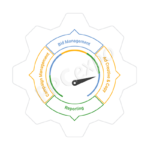In the ever-evolving world of digital marketing, it’s crucial to measure the success of your SEO efforts. Key Performance Indicators (KPIs) play a critical role in tracking and assessing the impact of your SEO strategies. As a B2B digital marketing agency serving clients across Southeast Asia, it’s important to understand the essential KPIs that can help you determine the effectiveness of your SEO campaigns.
In this post, we’ll outline the top KPIs you should be tracking to ensure that your SEO-focused content is delivering results for your B2B clients. From website traffic to conversion rates, these KPIs will provide valuable insights into the performance of your SEO initiatives and help you make data-driven decisions to drive growth.
Introduction to Key Performance Indicators (KPIs) for SEO
Key Performance Indicators (KPIs) are metrics that help you track and measure the success of your B2B SEO strategies. They provide a clear picture of your website’s performance and help you understand what’s working and what’s not. KPIs can range from simple metrics like website traffic and bounce rate, to more complex ones like conversion rates and goal completions. When choosing KPIs for your SEO efforts, it’s important to consider your business goals and choose metrics that align with those goals.
For example, if your goal is to increase website traffic, you may want to track metrics like number of visitors, pageviews, and sources of traffic. If your goal is to improve conversion rates, you may want to focus on metrics like goal completions and conversion rate. By tracking the right KPIs, you can get a comprehensive view of your SEO performance and make data-driven decisions to drive growth.
4 KPIs to Track for your SEO Content
1. Website Traffic
Website traffic is a critical KPI for measuring the success of your SEO efforts. It provides insight into the number of people visiting your website and can help you determine the overall health of your site. There are several metrics related to website traffic that you should be tracking, including:
- Number of Visitors: This metric tells you how many people are visiting your site. It’s important to track this metric to get a sense of your site’s overall popularity and to see if your traffic is increasing or decreasing over time.
- Number of Pageviews: This metric tells you how many pages on your site are being viewed. A high number of pageviews is a good indicator that people are engaging with your content and finding it relevant.
- Sources of Traffic: It’s important to understand where your traffic is coming from. Is it primarily from organic search, referrals, or direct visits? Understanding the sources of your traffic can help you make informed decisions about where to focus your efforts in the future.
Tracking these metrics will give you a better understanding of your website’s performance and help you identify areas for improvement in your content. For example, if you’re seeing a decrease in traffic, you may want to look into optimizing your site for search engines, improving your content, or fixing technical issues that could be impacting your visibility. On the other hand, if you’re seeing an increase in traffic, it’s a sign that your SEO efforts are paying off and you may want to continue making investments in this area.
2. Keyword Rankings
Keyword rankings are an important KPI for measuring the success of your SEO efforts. It tells you where your website ranks in search engine results pages (SERPs) for specific keywords or phrases. A higher ranking for relevant keywords can lead to more visibility, traffic, and conversions for your site.
To track your keyword rankings, you can use tools like Google Search Console, SEMrush, or Ahrefs. These tools will provide you with data on where your site ranks for different keywords and how those rankings have changed over time.
Improving your keyword rankings requires a combination of on-page and off-page optimization. On-page optimization includes tasks like optimizing your website’s content and meta tags, while off-page optimization involves activities like building high-quality backlinks and increasing your social media presence.
It’s important to track your keyword rankings regularly to see how your SEO efforts are impacting your visibility in search engines. If you see a decline in your rankings, it could indicate that your site is facing competition from other sites or that your SEO strategy needs to be adjusted. On the other hand, if you see an increase in your rankings, it’s a sign that your SEO efforts are paying off and that you should continue making investments in this area.
By tracking your keyword rankings, you can gain valuable insights into the performance of your SEO-focused content and make informed decisions about where to focus your efforts in the future.
3. Bounce Rate and Time on Site
Bounce rate is another important KPI that measures the effectiveness of your SEO efforts. It tells you the percentage of people who leave your site after only visiting one page. A high bounce rate is a sign that your website is not delivering what visitors are looking for, which can impact your search engine rankings and overall performance.
To improve your bounce rate, you need to ensure that your website is providing a positive user experience. This can include:
- Optimizing your website for speed and mobile devices
- Providing clear and relevant information on your pages
- Making sure your site is easy to navigate
- Offering engaging and relevant content that keeps visitors on your site
It’s also important to segment your bounce rate data to understand how different pages on your site are performing. For example, you may find that your homepage has a high bounce rate, which could indicate a problem with your site’s design or content. On the other hand, if you see a low bounce rate on a particular landing page, it could be a sign that your site is effectively converting visitors into customers.
By tracking your bounce rate and making improvements to your website, you can improve the overall user experience and increase the chances of visitors becoming customers.
4. Conversion Rates
Conversion rates are an important KPI that measures the effectiveness of your SEO and website optimization efforts. It tells you the percentage of visitors who complete a desired action on your site, such as making a purchase, signing up for a newsletter, or filling out a contact form. A high conversion rate is a good indicator that your site is effectively converting visitors into customers, while a low conversion rate could indicate that there is room for improvement.
To improve your conversion rates, you may want to consider the following:
- Optimizing your website’s design and layout to improve the user experience
- Testing different call-to-actions (CTAs) to see what works best
- Providing clear and compelling information about your products or services
- Offering promotions and discounts to incentivize visitors to take action
It’s also important to segment your conversion rate data to understand how different pages on your site are performing. For example, if you see a high conversion rate on a particular landing page, it could be a sign that the page is effectively converting visitors into customers. On the other hand, if you see a low conversion rate on another page, it could indicate that the page is in need of optimization.
By tracking and improving your conversion rates, you can ensure that your SEO-focused content is effectively driving results for your business.
Track Your Vital SEO Metrics for Success
Tracking key performance indicators (KPIs) such as website traffic, bounce rate, conversion rates, and keyword rankings is essential for measuring the success of your SEO-focused content.
By understanding the performance of your website and identifying areas for improvement, you can make data-driven decisions that will help your business succeed in the digital marketplace. Regularly monitoring these KPIs will allow you to optimize your SEO strategy, stay ahead of the competition, and drive results for your business.





